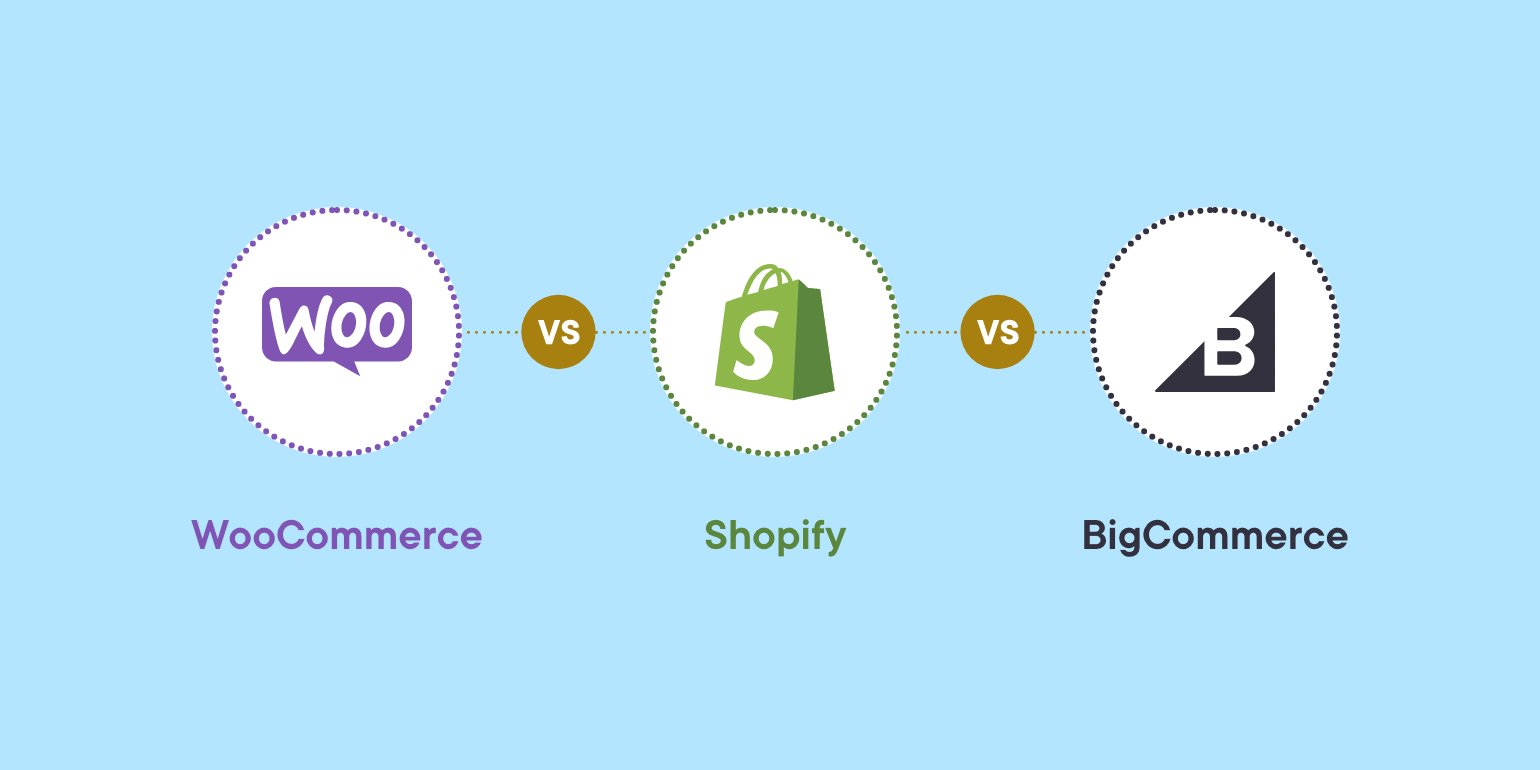Table of Contents
Overwhelmed by the numerous options for your existing or upcoming eCommerce store? You’re not alone. With the popularity of online stores growing over the last decade, it has become essential for businesses to sell their products and/or services online. Customers expect to buy many goods and services online and to address that need, it is essential that most every business give consideration to an online store.
Many entrepreneurs hire web developers to get their online business started. However, the DIY approach can prove to be much more economical for new business ventures. If you are up for the challenge of doing it yourself, how do you choose the right eCommerce solution for your services? This article breaks down three of the most popular and cost-effective eCommerce platforms available in order to help you decide where to take your business. We will explore the security, flexibility, cost, and features of WooCommerce, Shopify, and BigCommerce.
What is WooCommerce?
WooCommerce is a free plugin that integrates with WordPress, the world’s most popular CMS for building a website. WooCommerce powers 22% of all online stores, making it the most popular eCommerce platform in the world. Ripleys, Weber, and the Spectator Shop are all loyal users of WooCommerce.
What is Shopify?
Shopify is an all-in-one package where you can create and publish your own store completely through Shopify. It is cloud-based, eliminating the need for pesky software upgrades. Approximately 18% of all online stores use Shopify. Budweiser, the New York Times Shop, and Penguin Books all use Shopify.
What is BigCommerce?
BigCommerce is also an all-in-one solution where customers can build an eCommerce store without purchasing hosting or themes from third-party companies. BigCommerce tends to target larger brands and organizations and represents just 3% of all online stores. Toyota, Martha Stewart, and Gibson are all major corporations that use BigCommerce.
Security
Because eCommerce stores handle not only listing products and goods for sale but also the financial element and the delivery information of transactions, high-level security is crucial to running a successful store.
An SSL certificate, also known as Secure Sockets Layer certificate, is responsible for protecting your website from hackers accessing the personal information of your customers. It ensures that the following things happen:
- Secure processing of personal information like credit cards
- Boosts your SEO as Google takes notes of sites with an SSL certificate
- Gives your customers the assurance that they are on a safe site
WooCommerce – because WooCommerce works with WordPress, it does not come with built-in security. Security is handled by WordPress itself and by the hosting provider. Likewise, an SSL certificate must be sourced separately. However, most hosting providers will provide you a free SSL certificate and WordPress itself is quite secure.
Shopify – because Shopify is a hosted eCommerce platform, the security is taken care of by Shopify. Shopify has a built-in SSL.
BigCommerce – like Shopify, BigCommerce is a hosted eCommerce platform, which means security is completely covered and an SSL certificate is provided. BigCommerce does have additional flexibility with its SSL certificates. Specialized SSL certificates can be built or transferred from third-party websites if the business needs something more customized.
Shopify and BigCommerce take the security concern out of your hands. WooCommerce can also be every bit as secure as those two but may take a little more tweaking.
Flexibility
Your eCommerce store needs to look good and suit your brand’s aesthetics. Determining which of these titans has the flexibility to meet your needs can be critical to your website’s success.
WooCommerce – this is an exceptionally flexible platform because of its open-source nature. Developers can add custom-built plugins to the store and because WooCommerce is self-hosted, all of your store’s files would be located on your own server and you can modify any features as you’d like. Moreover, WooCommerce has no limits on the number of product variations you have. If you have a coding background or are open to working with a developer then this is the best option to make your website shine.
Shopify – this platform is hosted, which means Shopify manages your software for you. There is flexibility here but you’re limited to making changes within Shopify’s parameters. On the product variation side, Shopify puts a cap on 100 variants per product and 3 total options per product.
BigCommerce – As a hosted platform, BigCommerce’s flexibility is similar to Shopify’s, except they don’t cap product variations.
In terms of overall flexibility, WooCommerce gives the most creative control to the business operator. While Shopify and BigCommerce offer customizations that may fit your needs today, it is possible that in the future you will be restricted from what you can and cannot do on those two platforms.
Cost
Breaking down the most economical eCommerce platform can be challenging as Shopify and BigCommerce have set price plans. Meanwhile, WooCommerce is a free plug-in with add-ons that need to be purchased for it.
WooCommerce:
- Free plugin to add to your WordPress site
- SSL security – free with Let’s Encrypt, up to $199/year for certain certificates
- Web Hosting – $5/month or more depending on traffic. Some WooCommerce sites spend thousands of dollars each month on hosting.
Shopify:
- Free 14-day trial, an opportunity to test before committing
- Post-trial period, there are three options, all of which feature the online store, unlimited products, a range of staff accounts, 24/7 support, and sales channels
- The price breakdown:
- Basic Shopify – “All the basics for starting a new business”
- $29 per month
- Shopify – “Everything you need for a growing business”
- $79 per month
- Advance Shopify – “Advanced features for scaling your business”
- $299 per month
- Basic Shopify – “All the basics for starting a new business”
- Depending on your transaction quantity and revenue numbers, Shopify can charge thousands each month for high traffic/high transaction sites.
BigCommerce:
- A free 15-day trial before you buy
- Like Shopify, BigCommerce has three core price plans. All plans provide unlimited bandwidth and zero transaction fees.
- Standard – Sell online with your own beautiful online store
- $29.95 per month
- Does not include abandoned cart recovery features, a vital tool for businesses looking to scale
- Plus – Grow your online business with marketing tools proven to increase conversion
- $79.95 per month
- Pro – Scale your growing business with a comprehensive set of features
- $249.95 per month
- Like Shopify, high-transaction or high-revenue stores can incur much more expensive costs as growth increases.
- Standard – Sell online with your own beautiful online store
The most economical eCommerce platform here is WooCommerce. Both Shopify and BigCommerce are expensive and rigid in their pricing structure. With WooCommerce, you are able to build your own pricing plan with what you chose to add to your store.
Features
Brand promotion is the key to healthy growth for any business. Entrepreneurs must have an arsenal of marketing tools to draw people to their site and an easy interface to keep them there.
SEO, or Search Engine Optimization, is how you get your website on a higher rank when it’s searched on Google or any other search engine. It is a critical aspect of selling online. All three eCommerce companies provide SEO tools that:
- Edit meta titles
- Update URLs
- Add image alt texts
Social Media is also critical for keeping you in touch with your audience and is a powerful way to promote new products, sales, and events. Some of the top features of each platform are as follows:
WooCommerce – Key Features:
- No holds bar optimization. You can manage every visual aspect
- Built-in blogging
- Ability to embed products
- You can add sharing buttons, social media marketing apps, and link your posts
- User reviews and ratings (add product rating to page)
Shopify – Key Features:
- Discount codes
- Over 100 payment options
- Abandoned cart recovery
- Website and blog
- Modern and user-friendly administration
BigCommerce – Key Features:
- Integration with several marketing services, including Mailchimp
- Discount coupons and gift vouchers
- Product review functionality (not typically available on other platforms)
- User-friendly admin page
- Drag and drop builder
All three platforms are solid and offer wonderful features to power up your eCommerce store/business. After looking at their security parameters, flexibility, pricing, and platform features, how does one choose the best one for their needs?
BigCommerce would suit a larger business that sells to scale. If you are selling a handful of products, there are cheaper alternatives for your store. BigCommerce users would benefit from a bit of tech knowledge to be able to use it to its full ability. And while BigCommerce does allow users to customize some aspects of their online stores, it is not as flexible as other options.
Shopify is the most user-friendly choice and very easy to get started on. If you’re selling simple products, Shopify is a good option. Because Shopify only shows three product attributes, like size, weight, or color, it is best to use this for uncomplicated products. If your products have more specifications or your store requires more customization, you may find Shopify too limiting.
WooCommerce is hands down the best option for WordPress users who want to host their own site. This is more suitable for those with coding skills and who want full creative brand control of how their store looks. It is the king of customization. And if you don’t have coding skills? A massive (and easy to find) community of developers, designers, and web professionals is at the ready to bring your eCommerce dream to life.
To learn more about WooCommerce and how the experts at Multidots can customize and optimize your store contact us today. Our engineers can help to meet your organization’s needs while handling thousands of SKUs, including quick server response and faster page loading time.
References
Take Your WooCommerce to the Next Level!
Contact us today to craft your perfect WooCommerce solution.
(or contact us)


